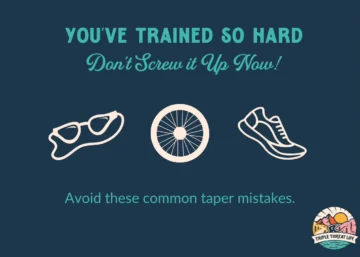
“No one casually does an Ironman, although some people might say that… There’s hard work, commitment, and sacrifice, so think about why you chose this.”
“Figure out your why and make it something you can hold on to. You need to dig deep and do some soul searching.”
“When your body breaks and your mind takes over, you can let it ruin your race or you can let it give you that extra bit of gas you didn’t think you had.”
This amazing quote isn’t my own. It came from my friend, Robin Barth, a triathlon coach I interviewed for an article in Triathlete.
As a writer, I’m a sucker for a standout quote, and this one is brilliant for a few reasons.
- It captures the intention and consideration that should go into the decision to do an Ironman.
- It suggests that for any worthwhile challenge we need to do some soul-searching to find our why.
- It reminds us of the incredible power of the mind to persevere and overcome when the body may fail.

Why do you want to do an Ironman?
It’s an interesting question, because the answer is different for everyone.
This week, Ironman shared a reel from Ironman Hamburg where they asked athletes why they decided to race an Ironman. The answers ranged from inspirational and poignant to humorous and thoughtful.
- “To be an inspiration for my daughter.”
- “To push myself to be my best.”
- “Because it’s a just fantastic thrill when you cross the finish line.”
- “Because it’s now or never.”
- “To get to know your limits.”
The secret is that there’s no right or wrong answer. It just needs to mean something to you.
I remember when I was thinking about doing my first Ironman. People used to say, “You need to find your why.” Honestly, I thought it was a bit silly. The notion of finding my why seemed a bit airy fairy to me, too “feelingy” for my taste.
But after some reflection, I realized that my why didn’t have to be this large, impressive thing, like doing an Ironman in honor of a loved one or raising money for charity. It just had to mean something to me.
Your why is like your North Star. It’s a reference point for your decisions and actions. It focuses your efforts and keeps you moving in the right direction.
Is it your motivation? Sure, but it’s more than that.
Your why comes from within. It’s a reflection of your thoughts, beliefs, and attitudes. In this way, everyone has a why, even if you don’t know what it is yet.
Is there a wrong reason to do an Ironman?
Yes, there are wrong reasons to do an Ironman, just like there are wrong reasons to do anything in life, really.
- To prove something to other people
- Because it’s the next step in a logical progression
- For FOMO (fear of missing out)
- Because all your friends are doing it
Dr. Jim Taylor wrote an excellent article for Triathlete where he talks about the right and wrong reasons to do an Ironman. I’m paraphrasing here, but he explains how doing an Ironman won’t bring you inner peace or contentment. Doing an Ironman may help you swim, bike, and run away from your problems (for a time) but the race will end at some point.
It’s not going to make you a better person. It’s not going to make you love yourself more or make others respect you.
“If you’re looking for answers to your life’s questions at the finish line, you will probably end up frustrated and unsatisfied because those answers will, ultimately, not be found in an Ironman or any finish line really.” – Dr. Jim Taylor
So if those are the wrong reasons, then what are the right ones? Here are a few.
- To learn how to overcome adversity and become a more resilient person
- To push your physical and mental limits
- For the pure challenge of conquering the distance
- To feel inspired to do something you didn’t think you were capable of, and to inspire others
German philosopher, Frederick Nietzsche said, “He who has a why can endure any how.”
Your why provides stability and direction in chaos and times of trouble. So whether it’s an Ironman, an ultra marathon, or any other feat of athletic insanity, you need to do some soul-searching to find your why.
This isn’t just for athletes. It’s applicable for any challenge in life, whether it’s starting a new business, getting engaged, becoming a parent, or moving across the country.
No matter what we do in life, we need to know why we’re doing it.
Back to Barth’s quote, I love her word choice.
“There’s hard work, commitment, and sacrifice, so think about why you chose this.”
It’s a reminder that the decision to do an Ironman (a 70.3 or any other challenge) is yours, and it’s something that shouldn’t be taken lightly. It should be done with intent and thoughtful consideration.
“Figure out your why and make it something you can hold on to. You need to dig deep and do some soul searching.”
Your why needs to be something you can hold on to. Is it something that’s going to help you push through when you get to mile 20 of the marathon? If not, it’s probably not your why.
“When your body breaks and your mind takes over, you can let it ruin your race or you can let it give you that extra bit of gas you didn’t think you had.”
In any extreme endurance event, there’s going to be a point when you approach your physical limit. But in reality, your physical limit is likely much different than you realize, because it’s affected by your mental limit.
One of my favorite books on this topic is Endure: Mind, Body, and the Curiously Elastic Limits of Human Performance, by Alex Hutchinson. He talks about our physical limits: pain, muscle fatigue, the need for oxygen and examines how our central governor tells us when we need to slow down, back off, or give up.
“A suitably versatile definition that I like, borrowing from researcher Samuele Marcora, is that endurance is ‘the struggle to continue against a mounting desire to stop.’” – Alex Hutchinson
If that isn’t an accurate description of doing an Ironman, then I don’t know what is.

I don’t think I can write this whole post and not tell you about my own why… so here goes. My decision to do an Ironman wasn’t grandiose or philosophical. It wasn’t even incredibly thoughtful or reflective.
I decided to do an Ironman during a long run, a particularly bad one actually. I was running on a trail in the heat of the summer. It was horribly hot and humid. I kept looking at how slow my pace was, getting frustrated, when all of a sudden I had this realization.
If I can get through this spectacularly awful run, then of course I can do an Ironman!
My why was less about pushing my limits, because I knew it was something I could do. I didn’t really care about the title that came with it. I didn’t do it for anyone, or in honor of anyone, or to inspire anyone.
My why was really just about conquering a new challenge. I wanted to do something I’d never done. I wanted to cover this unimaginable distance and see what it looked like on the other side.
Your why can change over time. I’m sure by the next time I do an Ironman, my why might look a bit different. But that’s ok.
Ultimately, your reason for doing something doesn’t need to matter to anyone else, as long as it matters to you.


